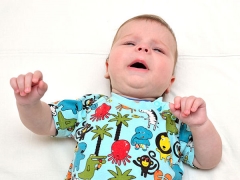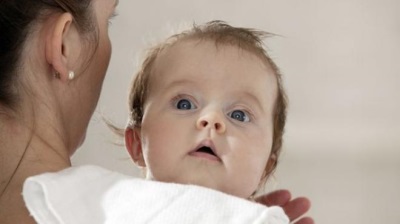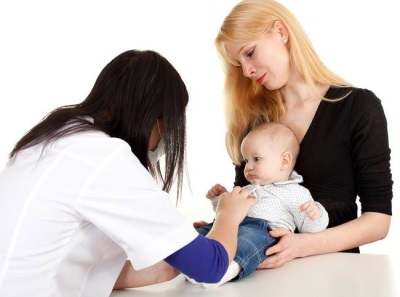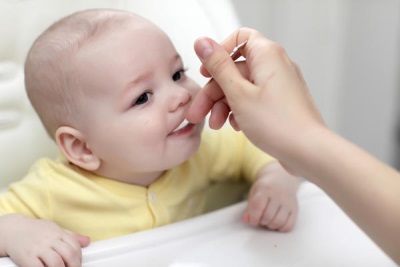Vomiting in newborns and infants
A symptom such as vomiting in a small child can be a non-dangerous symptom if, for example, it appears after overeating. However, much more often vomiting of the child’s body signals adults to various diseases. Why does a child have vomiting episodes, how is it dangerous and how can you help your baby?
Symptoms and possible causes, what to do?
Cause | Additional symptoms | What to do |
Binge eating | No other adverse symptoms. | Reassure the child and continue to try not to bathe and shake the child after eating, and also not to give him more food than he should eat at his age. |
Prolonged crying | There are usually no other symptoms. | Try to calm the baby and monitor the condition of the baby, and if vomiting repeats, call the pediatrician. |
Intestinal infections | Diarrhea, abdominal pain, fever | Call the pediatrician at home, start giving the child medication for rehydration. |
New Blend | Sometimes changes in stool and allergies | Call the pediatrician to make sure that the cause of vomiting is indeed a mixture change. Together with your doctor to choose the right food and not to change it, if there is no good reason. |
New product complementary foods | Other symptoms are usually absent and the vomiting itself is one-time. | Watch some time for the baby and be more careful with the introduction of new meals. Give the baby only fresh and not expired products. |
Poisoning | Stool changes (diarrhea), abdominal pain, nausea, fever | Immediately call a doctor and make sure that your baby does not become dehydrated. |
Foreign body in the esophagus | Restless behavior of the child, excessive salivation, breathing problems, sometimes mucus and blood in the vomit. | If you suspect that a baby could swallow a large object, you should immediately call an ambulance. |
Concussion | Long crying, loss of consciousness, drowsiness, discoordination of movements, pallor | Immediately call an ambulance. |
Acute abdominal pain, fever, weakness, nausea, restless behavior of babies, strong crying | Seek medical attention without delay, as this is a dangerous surgical pathology, which in newborns and babies has a large percentage of mortality. | |
Intestinal obstruction | Strong abdominal distention, admixture of bile in the masses released during vomiting, intense crying, anxiety, bloody stools like red jelly | Seek medical attention immediately, as this is a very life-threatening illness. |
Allergic reactions or individual intolerance to products | Diarrhea, skin rash, restless behavior of the child | You should contact your child with a pediatrician, as well as an allergist. |
ARVI | High fever, cough, sore throat and other symptoms | Refer to the pediatrician who will prescribe the appropriate treatment. |
Congenital abnormalities of the digestive system | Restless behavior of the baby during feeding, impaired stool, abdominal distension, weight loss | Having noticed problems with the work of the digestive system in a child, one should consult a doctor and be examined by the gastrointestinal tract. |
Congenital developmental pathologies or birth injuries of the nervous system | Drowsiness, convulsions, increased irritability, tremor, strabismus and other neurological symptoms | The child should be shown to a neurologist, who will prescribe a suitable treatment. |
Cramps, high body temperature, skin rashes | Call an ambulance without delay, as the treatment of this disease should be started as soon as possible. | |
Whooping coughpharyngitis or sore throat | Bouts of cough, sore throat | Call the pediatrician and follow his instructions. |
Heatstroke | Flaccidity, rapid pulse, hot, dry skin, reddening of the skin, dizziness, nausea, rapid breathing | Having noticed the signs of heat stroke, you should immediately call an ambulance, and before the arrival of the doctors, put the baby in a cool place, making sure that the child’s head is on its side. |
The appearance of a bulge in the groin area | Refer the child to the surgeon. | |
Cyclic vomiting syndrome | Nausea, abdominal pain, weakness, pallor. All symptoms appear in a healthy baby and disappear without treatment. | Show the child to the pediatrician to rule out other causes of bouts of vomiting. |
How to distinguish from regurgitation?
In a small child, who often spits up after eating, it is important to be able to distinguish this harmless condition from vomiting, which can be a danger to the health and life of the child:
|
Regurgitation |
Vomiting |
|
Predominantly physiological process caused by the immaturity of the digestive tract |
Mostly a symptom of the disease caused by irritation of the vomiting center or receptors in the digestive tract |
|
Occurs after a meal - usually in 10-15 minutes, but may appear 30 minutes after feeding. |
May occur regardless of meal |
|
Usually occurs once |
May be multiple |
|
Milk is released, which may be undigested or curled up. |
Partially or fully digested food is emitted, masses with an unpleasant odor, may be yellowish in color and with impurities. |
|
The amount allocated small |
The volume of the selected masses can be large |
|
No gagging |
There are gagging urges |
|
Milk flows without pressure |
The contents of the stomach dramatically thrown out, vomiting is possible fountain |
|
The general condition is not broken |
General condition deteriorated |
|
The weight of the child does not decrease |
A child can lose weight |
|
The child is calm |
The child is restless |
|
No other disease symptoms |
Often, other symptoms of the disease join, such as diarrhea, nausea, saliva, high fever |
Danger of vomiting
Although vomiting is a defensive reflex that helps eliminate toxins, microorganisms, foreign bodies, or excess food from the body, quite often it is dangerous for a newborn or infant baby.
Primarily, vomiting is dangerous at the risk of causing a dehydration condition. The child loses mineral salts and fluid, their balance in the tissues is disturbed, which affects the work of the whole organism of the baby. And the smaller the crumb, the more dangerous for him such a loss. As soon as parents notice that the baby’s skin has become dry, the fontanel is sunk, the baby cries without tears, sluggish, there has been no urination for a long time, the baby’s weight has decreased, you should immediately call the doctor.
Another unsafe consequence of vomiting may be vomiting in the infant's airway. This is very dangerous, so during an attack of vomiting, the child should be positioned vertically, and in a recumbent position during sleep the crumb must always be with his head turned to the side.
Another danger for babies with frequent vomiting is weight loss. For an infant, weight is an important indicator, especially if the infant is lightweight or premature.
What to do?
If vomiting occurs in an infant, it is important to carefully observe the condition of the infant and make sure that it is not regurgitation. In most cases, such a symptom at such an early age should be a reason for referring to a pediatrician. It is better to be safe and show the crumbs to the doctor when the cause of vomiting is a dangerous situation than to miss the time and wait for a severe deterioration of the infant's condition.
When to call a doctor?
Parents must seek medical help in the following situations:
- The child is crying a lot, very restless, he has severe abdominal pain.
- If vomiting is present, the child does not have a chair.
- Symptoms of dehydration began to appear.
- Vomiting repeated many times.
- Emetic masses stand out fountain.
- Vomiting was joined by frequent stools.
- Before vomiting, the child fell from a height or hit his head.
- In the vomit there are blotches of blood, the masses have a brown or black color.
- The child has a fever, he is drowsy and lethargic.
- The kid refuses to eat and drink.
- With vomiting stands out everything that the baby ate and drank.
Treatment
Features of treatment of vomiting will depend on the cause that led to the appearance of this symptom in an infant. In this case, parents should remember that the main danger of attacks of vomiting lies in dehydration.
What to do before the arrival of the doctor?
- It is important not to start panicking, but to calmly wait for the pediatrician, being with the child.
- Baby should be in a vertical position.
- Try to move less child.
- Wash baby after each episode of vomiting and rinse the mouth of the crumbs.
- Do not feed the baby any other food other than breast milk or the usual mixture.
- Let's crumble drinking solutions with electrolytes.
- If you gave the baby a solution, and after that there was again an attack of vomiting, try to give the solution a drink again.
- Do not give any other drugs.
What give liquids?
To prevent dehydration, give the baby plenty of fluids. If the baby receives breast milk, it is necessary to apply the baby to the breast very often. The best option for replenishing the fluid lost during vomiting will be the use of special pharmaceutical mixtures of electrolytes.
If it is not possible to give the pharmacy drugs for rehydration to the baby, you can prepare the solution for sealing yourself, by dissolving salt (a teaspoon without a slide) and sugar (4-5 teaspoons) in boiled water (1 liter). Store this solution can be up to 24 hours. It should be given to the baby several milliliters every 5-10 minutes.
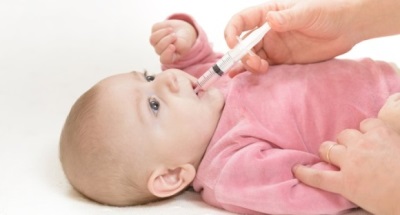
A child with vomiting cannot be treated with rice water, fruit juices, carbonated drinks, any kind of tea, or chicken broth or cow's milk. The use of such drinks can further increase the symptoms of dehydration.
The most important thing in the treatment of vomiting is to replenish the waste of a child’s fluid, and no medication can replace the otpivanie baby after episodes of vomiting. In addition, any drugs for infants should be prescribed by a doctor, as self-treatment of such young children is very dangerous for their life.
Antibiotics
When a child begins to vomit and diarrhea joins her, some parents think about antibiotics. However, in young children, the use of antibacterial agents can be dangerous and cause a number of complications. Only a doctor should prescribe an antibiotic to a baby with vomiting.
Antidiarrheal drugs with diarrhea
Both vomiting and liquefied stools are defensive reactions that help to remove harmful substances, bacteria and toxins from the baby’s body more quickly. The use of anti-diarrhea slows down the purification of the gastrointestinal tract from such substances, which often leads to deterioration.Prescribing antidiarrheal drugs should be done only by a doctor and is justified only in cases of very heavy diarrhea, when the stool is watery and the child loses a lot of fluid with them.
Enterosorbents
This group of drugs is considered relatively safe for children, but when it comes to treating infants, any medication should be given to the child very carefully. Sometimes the use of sorbents causes serious complications in young children.
Zinc
Studies have confirmed the effectiveness of the use of zinc in the treatment of diarrhea in children. However, before giving these drugs to an infant, it is imperative to discuss this treatment with a pediatrician.
Prebiotics and Probiotics
Prescription of drugs of these groups is justified in situations when vomiting was caused by a bacterial or viral intestinal infection, as well as when the baby was treated with antibacterial agents.
How to understand that treatment does not help?
You should be alerted by the following signs:
- Despite the measures taken, the condition of the crumbs worsened.
- Neither vomiting nor diarrhea becomes weaker in the last 24 hours.
- The baby has lethargy and drowsiness.
- You began to give the child a lot of drinking, and vomiting increased.
